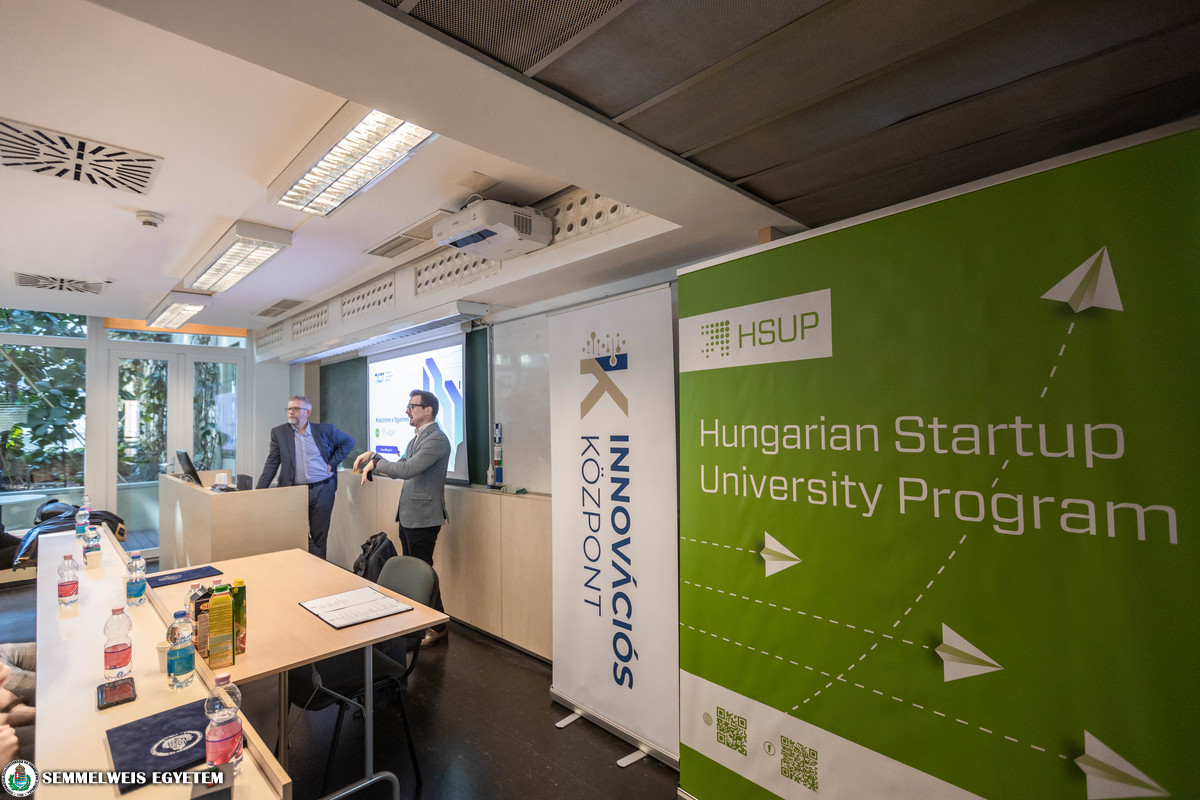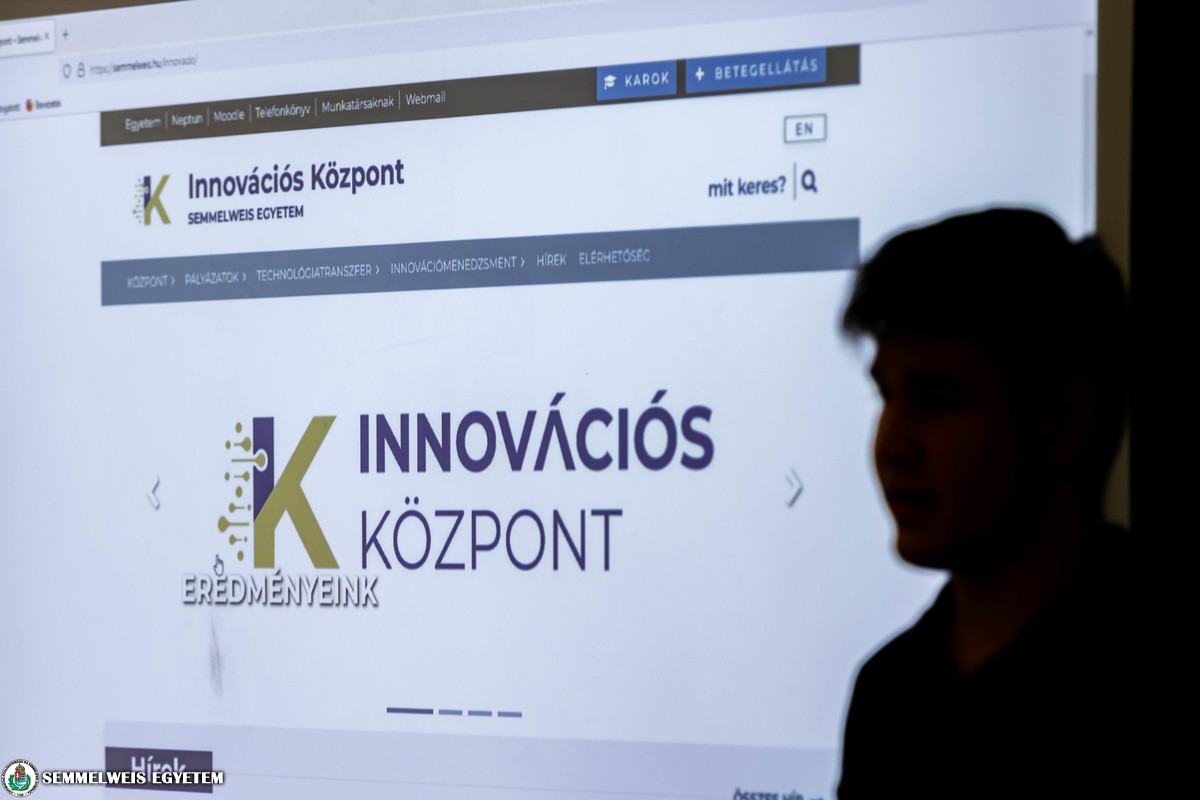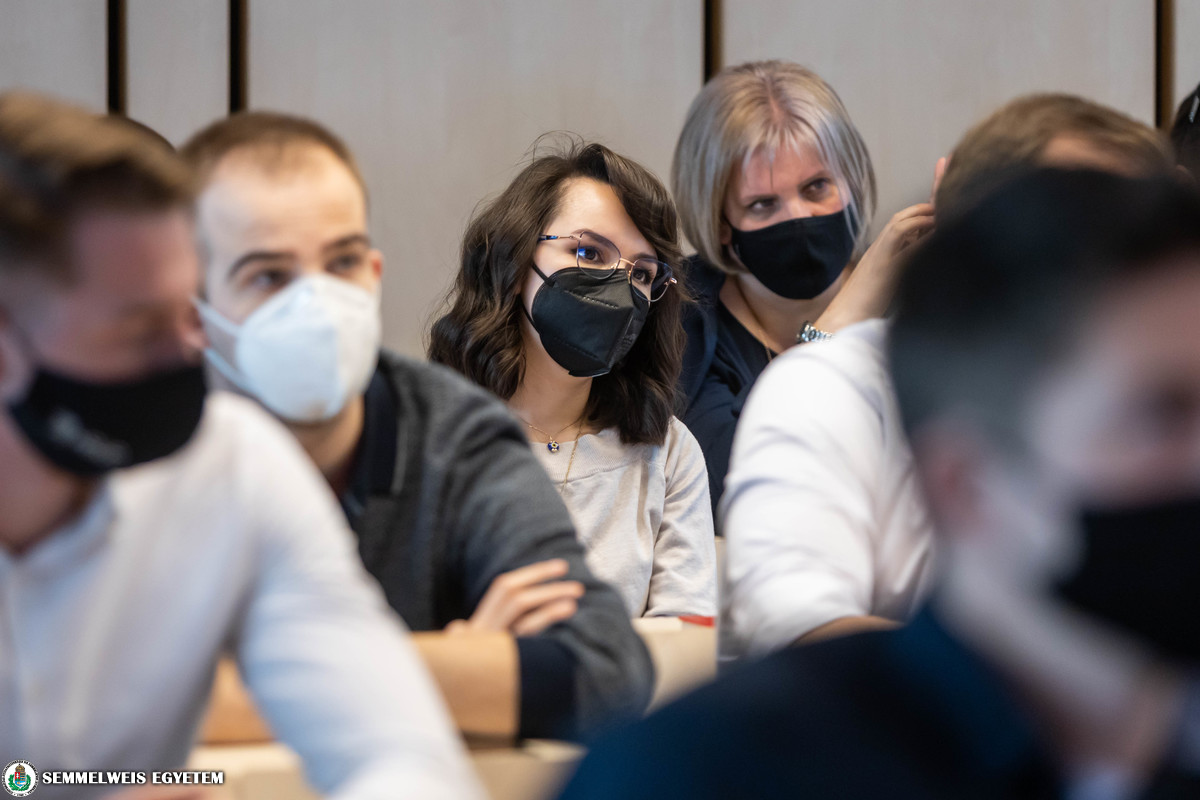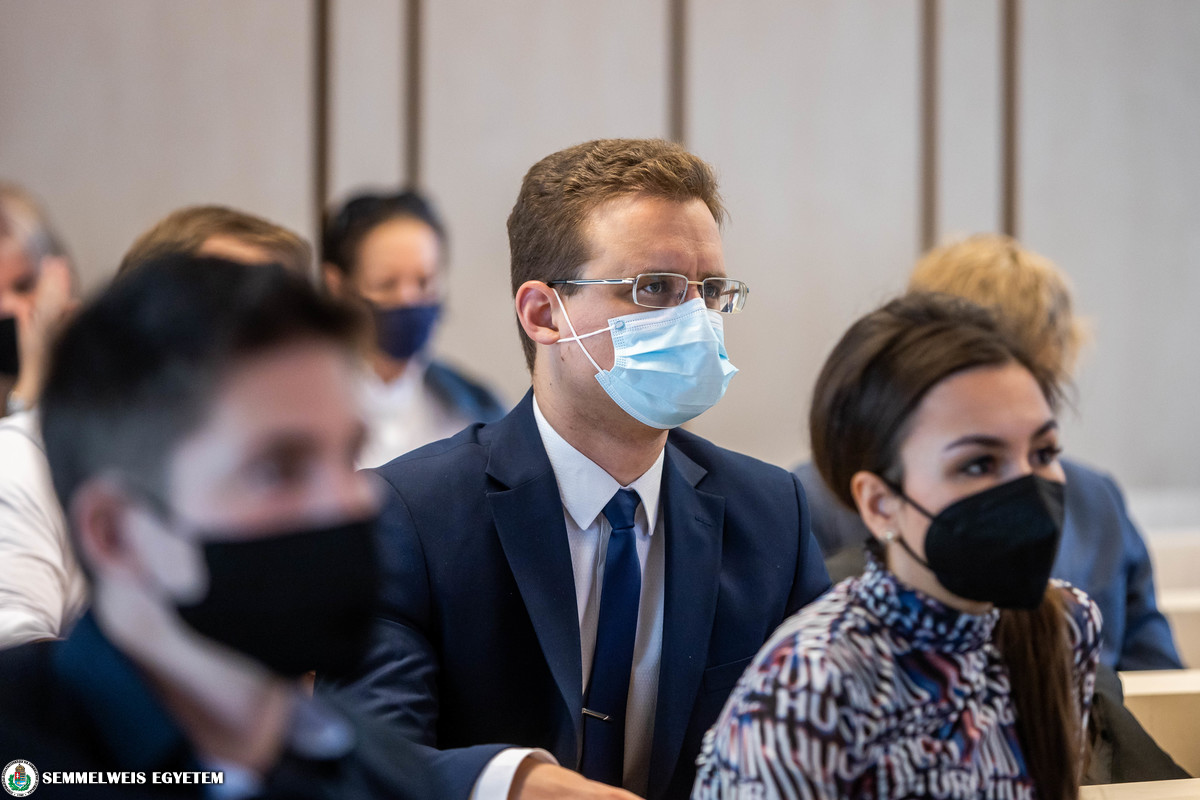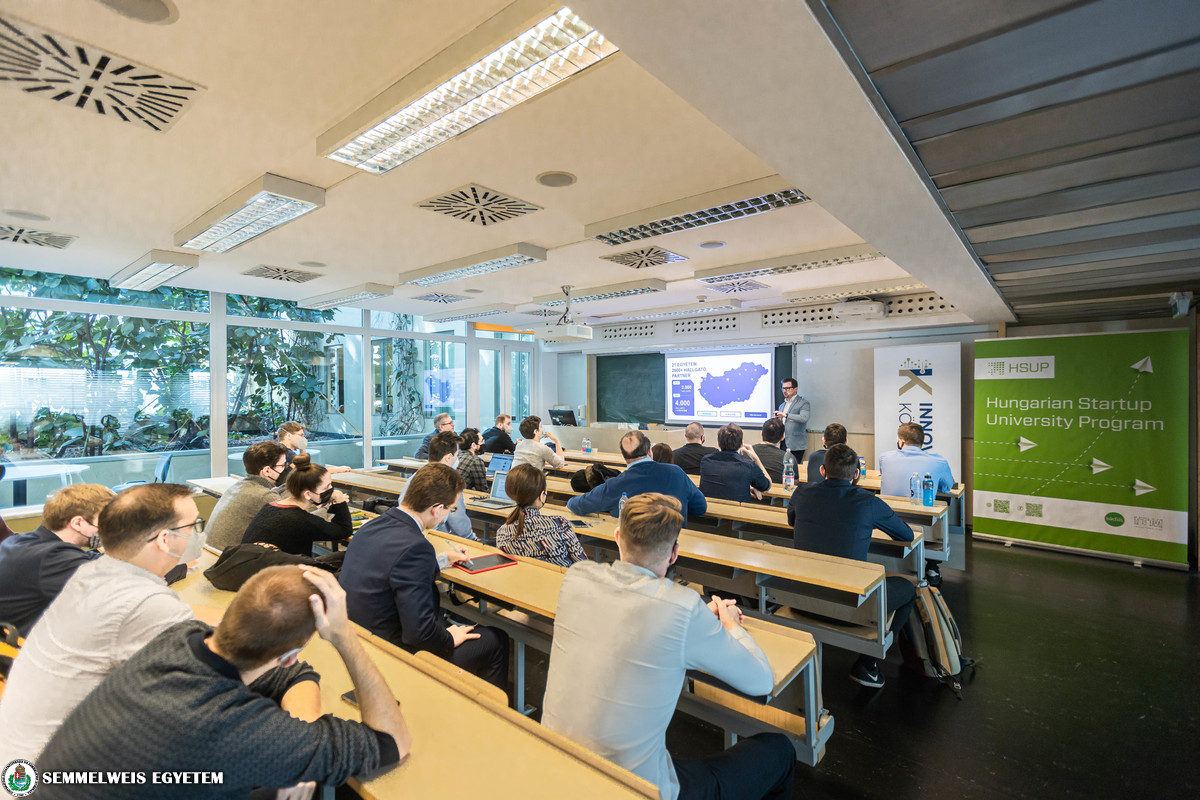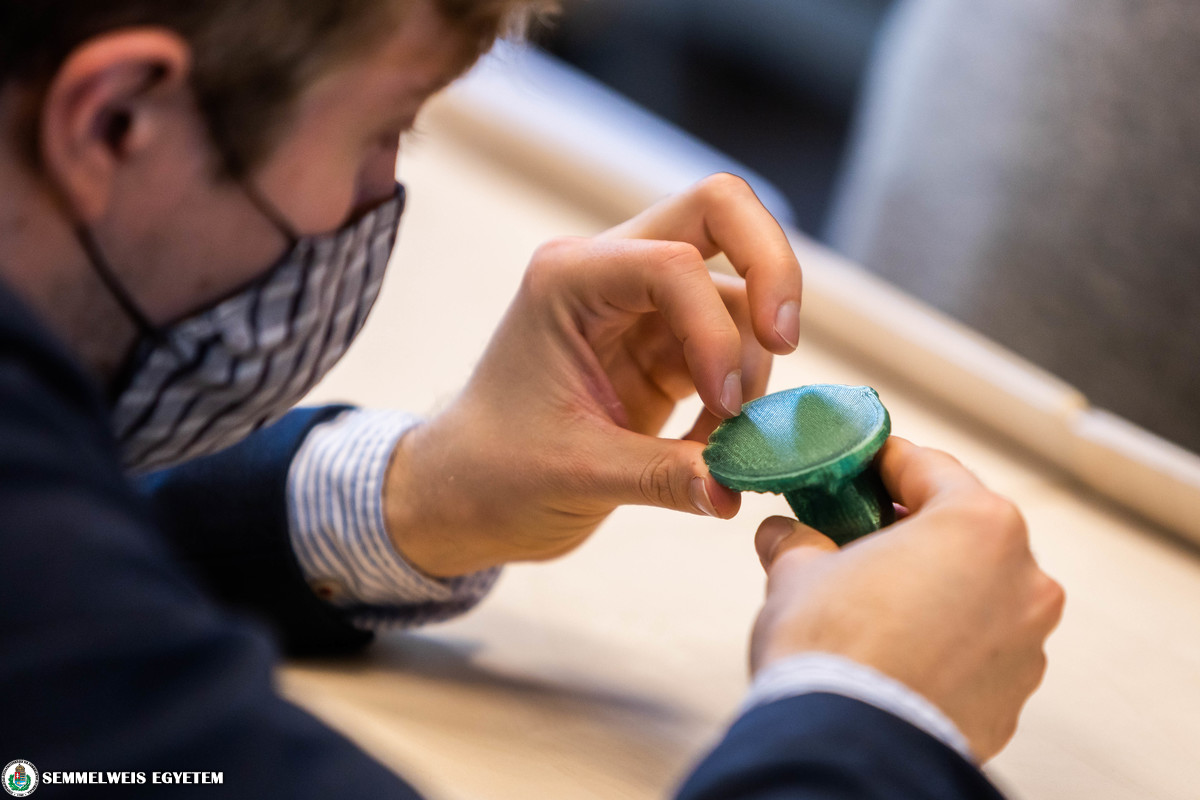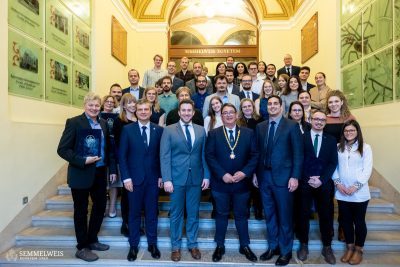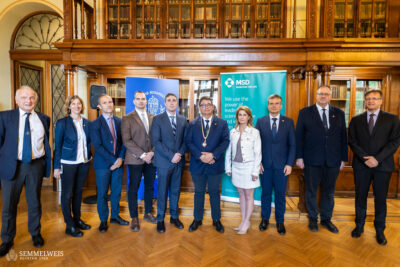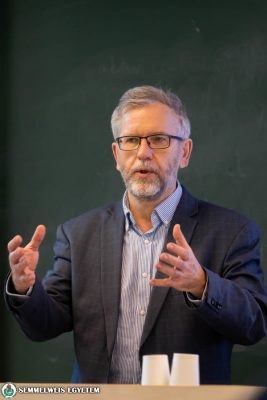 The program was launched two years ago at the initiative of the National Research, Development and Innovation Office (NKFIH), and since then more and more Hungarian higher education institutions have joined the program, including Semmelweis University. “Since September, students can learn about startups and the development of innovative ideas as an optional, online course,” said Dr. Gyula Szigeti, Director of the Innovation Center, in his introduction, adding that already many students are interested in the program. He said that the NFKIH has created the Express Innovation Agency to strengthen its service portfolio, which is now also responsible for the HSUP.
The program was launched two years ago at the initiative of the National Research, Development and Innovation Office (NKFIH), and since then more and more Hungarian higher education institutions have joined the program, including Semmelweis University. “Since September, students can learn about startups and the development of innovative ideas as an optional, online course,” said Dr. Gyula Szigeti, Director of the Innovation Center, in his introduction, adding that already many students are interested in the program. He said that the NFKIH has created the Express Innovation Agency to strengthen its service portfolio, which is now also responsible for the HSUP.
Krisztián Kölkedi, Deputy CEO for Strategy of the Express Innovation Agency and one of the founders of HSUP, gave a presentation on the process and background of the program. He said that their aim was to introduce students to the world of innovation so that in 5-10 years they would be able to work as successful entrepreneurs or developers, raising funds or capital. “We created and developed the HSUP talent management program as our own startup. Later on, we provide market and technology support to the projects born here, link them to international funding and incubator programs, and manage the process on a project-by-project basis with a customer-centric, service-oriented approach,” he pointed out. The program has a mindset-shaping effect: it encourages participants to start thinking about how to solve a problem.
“The most innovative ideas can receive a scholarship in the second semester, but those whose solutions don’t make it through will also benefit: the course will give them the chance to meet investors, business leaders and learn solution-focused thinking by joining teams of other winning ideas,”
– he said, adding that the curriculum has been designed to be colorful, engaging and collaborative, thanks to podcasts, videos and a “gamified” methodology.
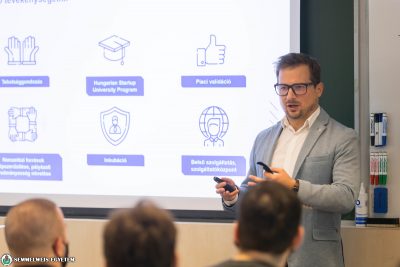 Afterwards, Krisztián Kölkedi also introduced the subject. HSUP is Hungary’s first nationally standardized e-learning start-up program at higher education level, consisting of two semesters. The first semester is mainly about shaping the students’ attitudes, creating interest, motivation, introducing the sector and transferring basic knowledge. At the end of the first semester, each student submits a one-page summary to showcase their innovation. If someone’s idea is not selected, they can still join another award-winning team of up to 5 people, who will each receive a monthly grant of HUF 150,000 to continue developing their innovation. The second semester will focus on building innovative companies, introducing the world of venture capitalists, financial, legal and startup skills and mentoring. At the end of the semester, students who have received a scholarship will be required to deliver a prototype (MVP) or a progress report. At the end of the program, HSUP also offers the opportunity to develop the idea further: participants can present their startup to investors and incubator programs. “Some students have met each other, founded a company and are now negotiating with investors on the international market – it took them a year and a half from starting the course to take their idea abroad,” said Krisztián Kölkedi.
Afterwards, Krisztián Kölkedi also introduced the subject. HSUP is Hungary’s first nationally standardized e-learning start-up program at higher education level, consisting of two semesters. The first semester is mainly about shaping the students’ attitudes, creating interest, motivation, introducing the sector and transferring basic knowledge. At the end of the first semester, each student submits a one-page summary to showcase their innovation. If someone’s idea is not selected, they can still join another award-winning team of up to 5 people, who will each receive a monthly grant of HUF 150,000 to continue developing their innovation. The second semester will focus on building innovative companies, introducing the world of venture capitalists, financial, legal and startup skills and mentoring. At the end of the semester, students who have received a scholarship will be required to deliver a prototype (MVP) or a progress report. At the end of the program, HSUP also offers the opportunity to develop the idea further: participants can present their startup to investors and incubator programs. “Some students have met each other, founded a company and are now negotiating with investors on the international market – it took them a year and a half from starting the course to take their idea abroad,” said Krisztián Kölkedi.
He pointed out that there are also many problems to be solved in the field of medicine and health sciences, so the program could also be useful for students in this field. The HSUP has now been joined by 27 higher education institutions, including Semmelweis University, and more than 6,000 students.
Krisztián Kölkedi stressed that they explicitly support startup teams made up of students from different universities, studying in different fields, as they encourage and complement each other’s thinking.
The information day also saw the presentation of three startups that have recently been established at other universities in the framework of HSUP and have received grants. ReFilamer aims to make 3D printing cheaper, greener and accessible to all. Their small-scale machine can produce filaments from PET bottles, which act as “ink” in 3D printing, allowing users to reduce their costs by up to 90%. “The 3D printer itself is now affordable, but the filament for it runs out very quickly and is very expensive,” said Hunor Kiri, the project leader, adding that there are around 11-13,000 hobby users in Hungary who spend an average of a quarter of a million forints on filament. He highlighted the potential of HSUP and also introduced the students to the process of building a startup.
Cashier Basket aims to make shopping easier. We spend 40% of our shopping time standing in line at the checkout, and the company is trying to provide a solution to this: the smart shopping trolley and mobile app it has developed makes shopping convenient and time-efficient, and reduces the human resource requirements of stores. “At the end of the second semester of HSUP, we got in touch with an investor with whom, after long negotiations, we signed a contract in 2021 and Cashier Basket Kft. was founded. When I started my master’s degree, I never thought I would finish my studies with a business,” said Gellért Nagy, the company’s founder, who emphasized the importance of being receptive to change and having a strong team behind the startup.
Kontekt’s product is a hardware and software device for seniors that connects to both traditional and smart TVs, allowing video calls to be made at the touch of a button. It makes it easy to connect with elderly loved ones who live far away and are averse to modern technology. “We made a prototype, took it out on the streets and markets, showed it to people and then developed it further based on their feedback,” said Ede Lőrinczi, the company’s director, who gave a presentation on how to develop an idea within the HSUP program and beyond.
In an interview with our website, Krisztián Kölkedi pointed out that this year HSUP can support 200 project teams with grants – the participating universities decide which startups will benefit. “Sometimes students feel like a failure if their idea doesn’t make it – we encourage them to join other teams that make it,” he said. He added: “Another recurring problem is that many people want to start a company immediately, without the right resources. “If that’s the intention, we’re clearly happy for them, HSUP will give them all the help they need and we’ll support them in that, but the program is not necessarily about startup formation, it’s more about transferring the mindset, about using the methodology of the startup world in everyday life,” he explained.
Ádám Szabó
Translation: Tamás Deme
Photo: Bálint Barta – Semmelweis University
